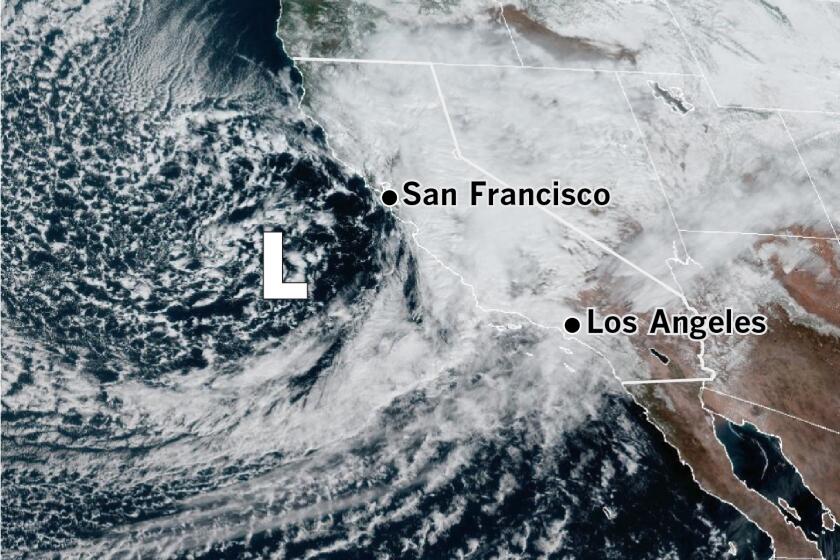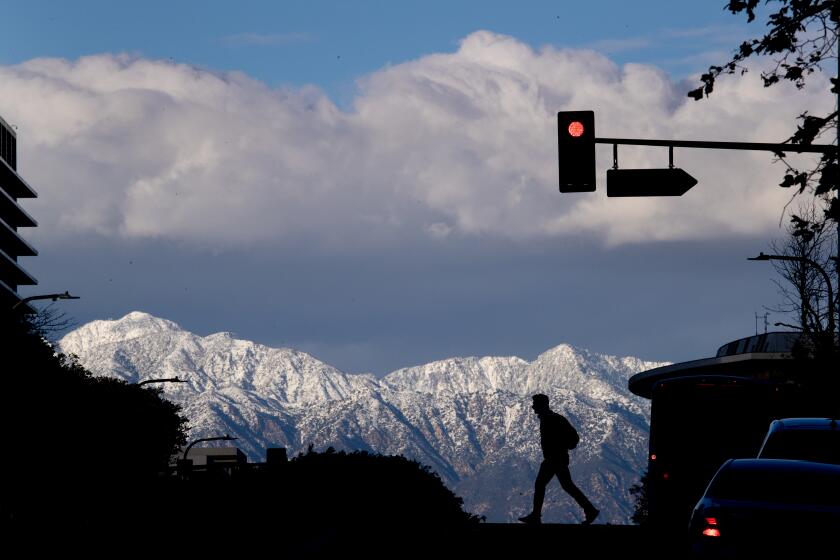Without enough shelter beds, homeless people find their own refuge in the storm
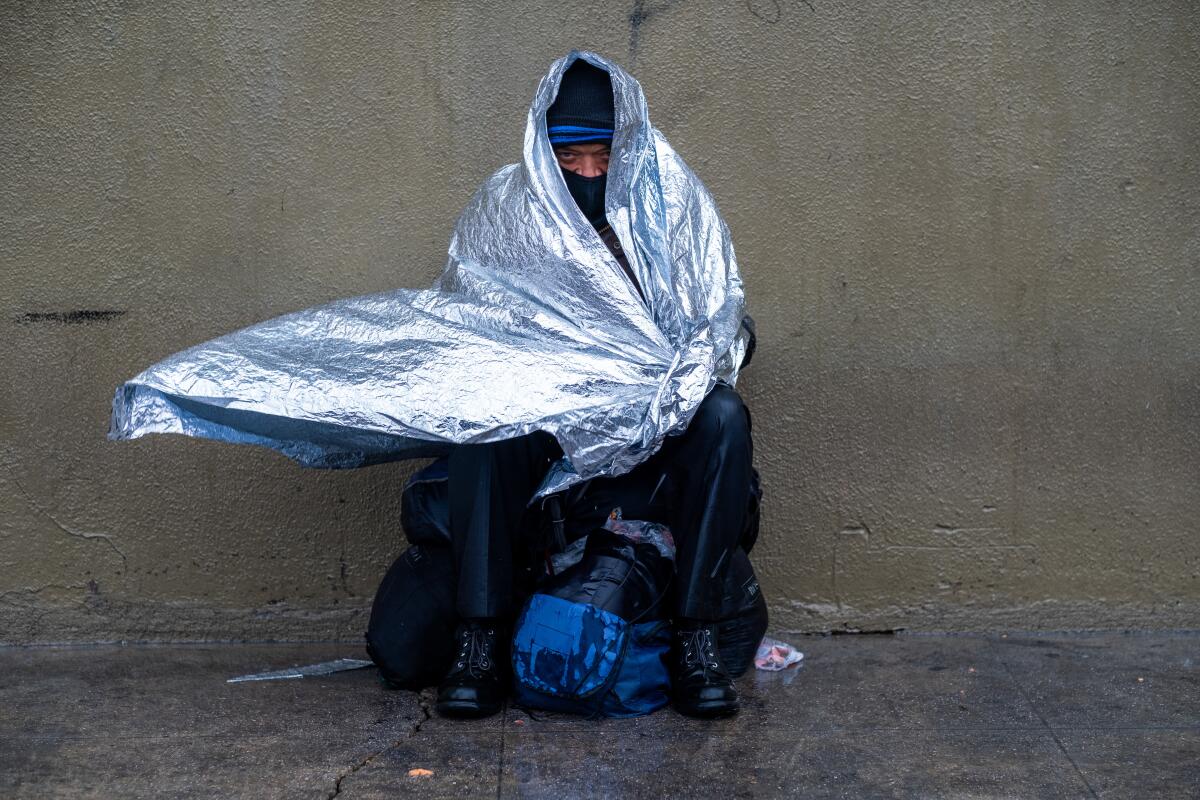
- Share via
As L.A.’s overwhelmed shelters filled up Friday, finding refuge from the pounding rain and freezing temperatures became a personal mission for most of the thousands of people who live outdoors.
Some relied on makeshift solutions while others merely endured.
James Blanton woke up Friday morning with snow on his tent and an ache in his body.
“My hands and feet feel a lot of stinging pain,” he said. “It’s hard.”
Blanton, 46, was hanging out with Chaz Hosein outside of a McDonald’s in west Lancaster on Friday morning, commiserating on his friend’s misfortune.
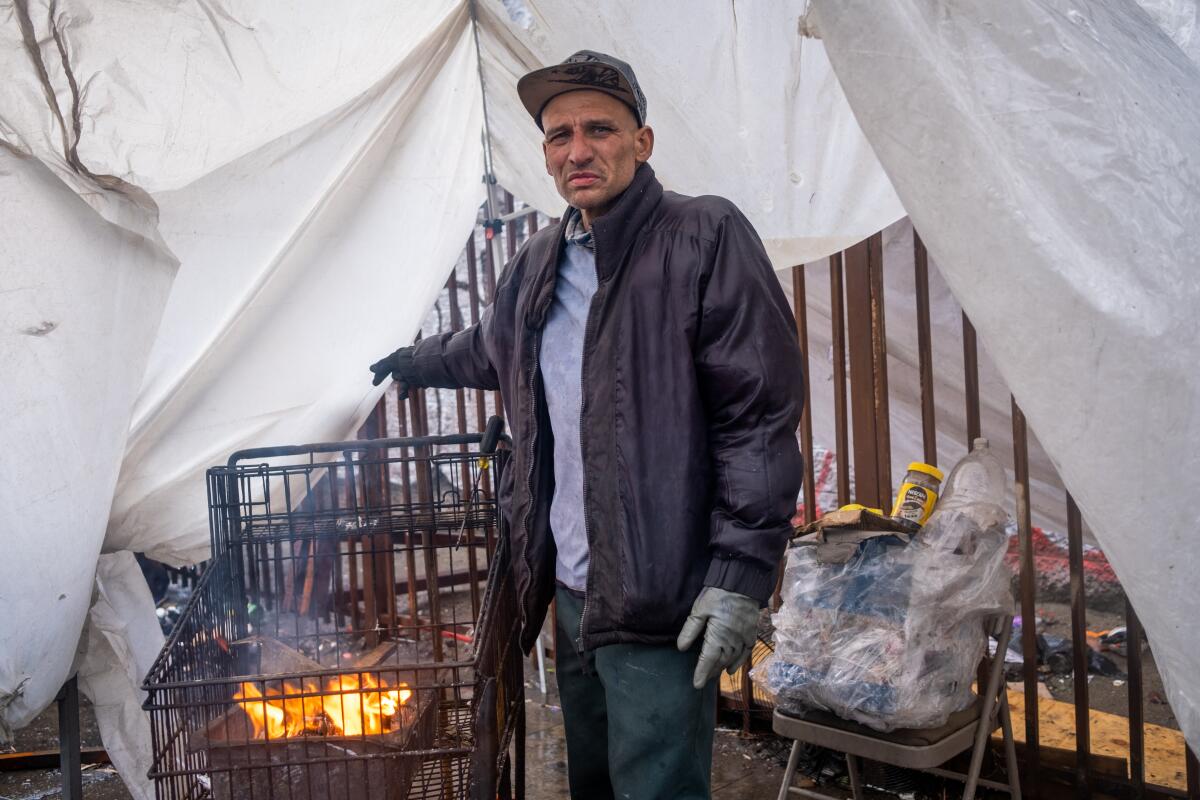
Hosein, 45, stood in the cold rain with his hands inside the pockets of his jacket, coughing and sniffing loudly.
Two weeks ago, he was in the hospital.
“My body had swelled up and I couldn’t breathe,” Hosein said. “The doctors told me it was congestive heart failure.”
When he returned to his encampment, he learned that sanitation crews had taken his tent and belongings. Since then, he has been sleeping on the ground, outside of the McDonald’s.
“I’m not getting well and I don’t know if I’m going to make it,” he said. “I feel like I’m going to be dead tonight.”
Hosein said he’s tired and upset that there are not enough resources for the unhoused in Lancaster. He’s mostly received assistance from homeless advocate Eneida Molina.
She dropped by Friday with a case of instant noodles, a blanket, gloves and medicine, including NyQuil.
“He’s really sick,” the longtime homeless advocate said. “He’s got no place to go and will most likely end up in the hospital again.”
Hosein said he had tried to get into a shelter but was turned away.
“We’re people,” he said, tearing up. “We need shelter.”
A weather spotter reported thundersnow, which is when lightning and thunder occurs during a snowstorm. The weather phenomenon will return to the Southland on Saturday.
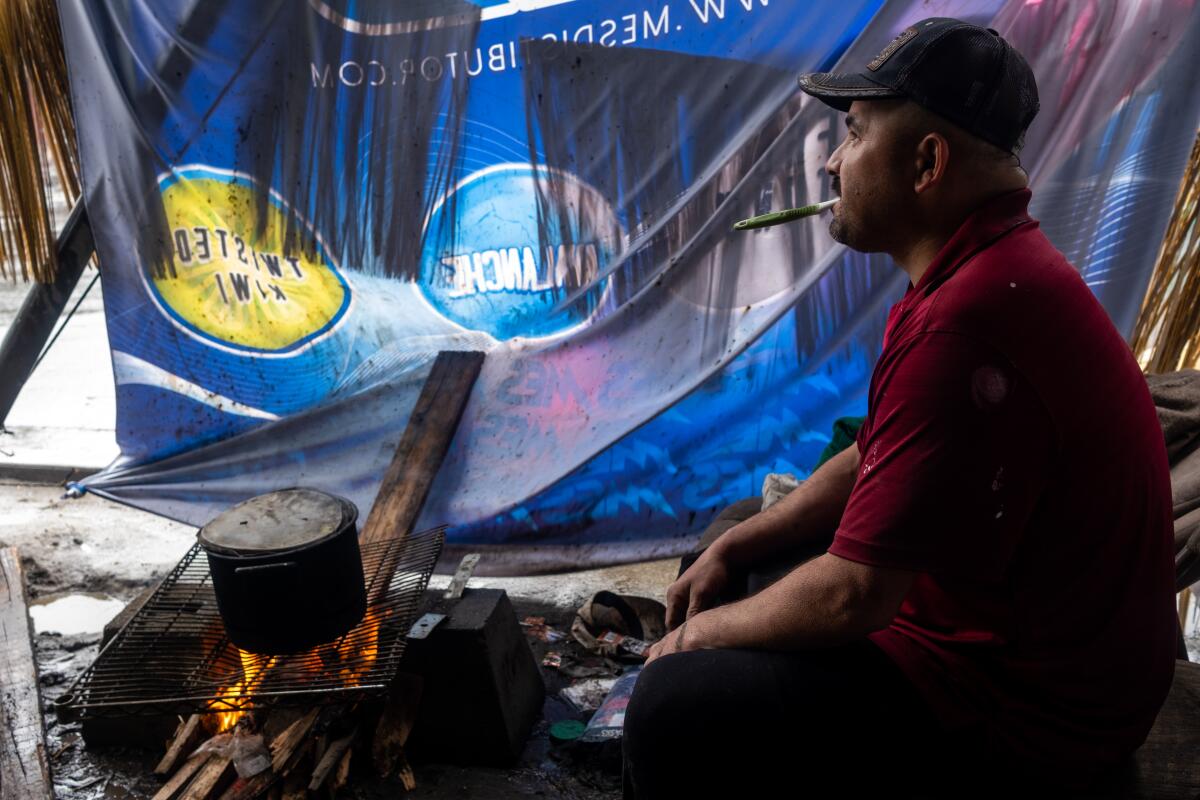
To serve the roughly 48,000 people living on the county’s streets, by the most recent estimate, the homeless system maintains about 11,000 year-round shelter beds, 270 winter beds and 27 hotels or motels that accept vouchers.
Many shun the shelters and willingly live with the consequences.
“I can’t do shelter or housing or all of that because rules and curfew and regulations,” said Carlos Ivan Parra, who moves around Boyle Heights and downtown, and said he doesn’t want to get too “comfortable.”
Parra, 45, was huddled under a tarp Friday afternoon on a sidewalk on skid row, warming himself with a fire he made in a shopping cart.
He said he has been living on the streets of downtown Los Angeles since he got out of prison in November 2019. He was put in housing at the Weingart Center but was kicked out after getting into fights. He said he struggles with meth addiction and had been diagnosed with schizoaffective bipolar disorder and post-traumatic stress disorder.
He’s considered going back into a shelter, but knows it’s not for him.
“It’s a mental thing,” he said. “I can’t deal with being under rules. What time I can get out, what time I have to eat, it just feels like I’m back in prison.”
Scenes from across Southern California, where a powerful winter storm dumped heaps of snow and record-setting rain.
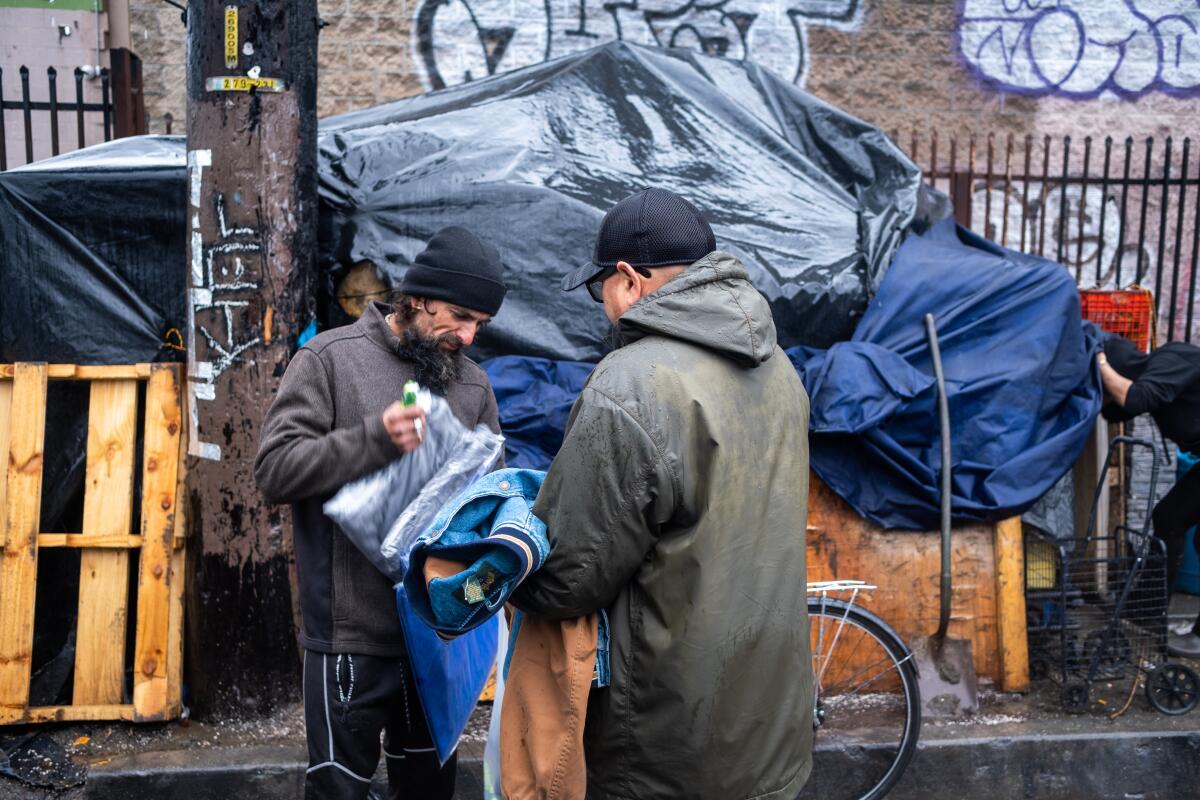
As this week’s storm approached, fire and law enforcement officials teamed up with outreach workers to patrol L.A.’s normally dry rivers and creeks urging those living there to seek higher ground before the channels turned deadly.
“Not all persons decided to heed our warnings,” Los Angeles Fire Department Capt. Erik Scott said. But those who stayed behind were not in the riverbed islands but on the outer bank, he said, and their strategy seemed to work.
As of Friday afternoon, there had been no swift-water rescues, Scott said.
In downtown Los Angeles, Union Station became an impromptu shelter for some.
On Friday morning, men were curled up in blankets at the entrance of the Metro Red Line, many carrying clear plastic bags with their belongings.
One of them, Billy Colbert, 85, was pondering his next move.
“I don’t know what I am going to do tonight, but I am going to stay dry,” he said.
Colbert said that he would consider going to a shelter but not on downtown’s skid row where so many homeless services are concentrated.
“It’s too filthy, too nasty,” he said. “I ain’t no fool. I would rather sleep in the street.”
Colbert has been living on the streets for six years and blamed himself.
“I was careless with my life,” he confessed. “I stopped loving myself.”
He’s gone through several shelter programs and found many of them to be “cutthroat” and did not want to return.
After much thought, he decided what to do.
“I’m riding the train,” he said walking off. “I’m going to Pasadena.”
Dorcea Mayden has a more stable orbit focused on Union Station.
“I’m not a tent person,” she said. “I’m a bus stop person.”
She and other women, mostly older, hang around the edges of Union Station where they can stay dry. When they are normally kicked off the property around 1 a.m., they head to nearby stairs, and by morning, when the station opens, head for the bathrooms.
“It’s full,” she said. “In the morning we come and dry with the [hand] blow dryers,” she said.
Mayden, a former aesthetician, has been in and out of shelter programs since 2011 after a rent hike at her Chinatown home. Compounding things, she wasn’t able to work after a stroke that affected her eyesight.
On Friday morning, wearing an orange plastic poncho, she leaned against a tall table eating a Subway sandwich as commuters whisked by. Next to her was a cart filled with food, clothes and toiletries. She said shelters won’t let her in with food or so many bags.
So, she has been spending nights along the stairs across from Union Station, where she says she and other women have weathered storms.
“It’s been raining, it’s been cold,” she said. “We sleep on the stairs. There are a lot of people there. Your fingers are numb, your toes are numb; you do what you have to do,” she said.
For some on skid row, the storm was a bearable inconvenience.
For the record:
9:40 a.m. Feb. 25, 2023An earlier version of this article misidentified Reynaldo Roman as Reynaldo Romar.
“People get used to it,” Reynaldo Roman said as he cooked beans on an open fire. “It’s a mental thing. They try not to think about it.”
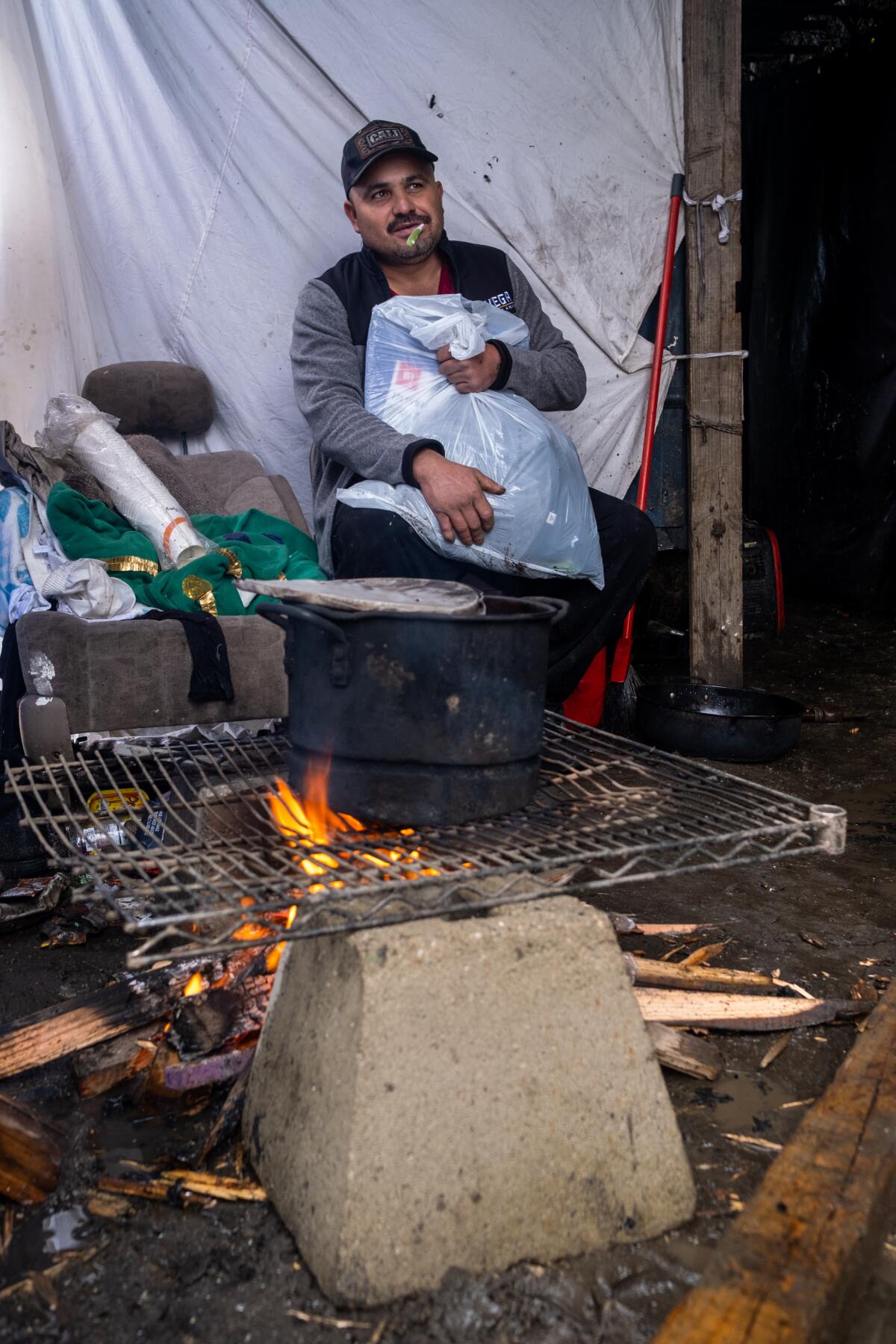
Roman, 39, said he has been living on the outskirts of skid row for about a year, after losing his job as a forklift driver and getting kicked out of his apartment. He built a shelter with a wooden roof.
On Friday, Paul Avila, founder of Pauly’s Project, came by to hand him clothing, gloves and other warm weather supplies.
Avila said he usually gives Roman raw meat so he can cook for the entire street, where about seven other people live.
Roman said it’s hard to stay warm and dry during a rainstorm. He didn’t have a jacket Friday so he stood close to the fire.
Roman, who moved from Mexico to the U.S. about three years ago, said he was unaware of warming centers or shelters but was not averse to going to one.
“I’m going to think about it,” he said.
Kitty Davis-Walker, a spokesperson for Union Rescue Mission, a skid row homeless shelter, said that it has received 47 calls from families needing shelter since Monday.
The organization’s three shelters — Hope Gardens, Angeles House and the one in downtown Los Angeles — were all full as of Thursday morning, she said.
“We have no more room,” she said. “We continue to try and get people sheltered. It’s bad. It’s really bad.”
With all the misery around him, Miguel Chavez, 26, caught a lucky break. He sat in the chapel of the Los Angeles Mission on Friday morning, enjoying a warm respite from his nights sleeping in the open as the temperature dropped.
“You could tell because my outer extremities would kind of go numb,” he said.
Chavez, who has been living on the streets of East Los Angeles and skid row for roughly a year, doesn’t have a tent and sleeps in the open with just a blanket to cover himself.
“It gets really cold at night and sometimes it starts to rain,” he said. “You don’t have a way to dry your clothes.”
Dealing with substance abuse and the recent death of his mother, Chavez came to the mission Wednesday hoping to get into recovery. He said he hasn’t been using drugs recently but was worried he couldn’t stay clean.
“I’m trying to stay that way, but for some reason I can’t stay that way when I’m out there,” he said. “I see what it does to people out here.”
He was one of the lucky ones. By Friday, the shelter was at capacity.
As about 100 people gathered for lunch Friday, Chavez was reflective.
“When you get here, you go, ‘Wow, I really did get accustomed to just needing a blanket.’ And I don’t want to get accustomed to that.”
More to Read
Sign up for Essential California
The most important California stories and recommendations in your inbox every morning.
You may occasionally receive promotional content from the Los Angeles Times.
